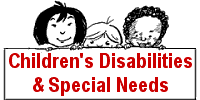 |

| |
|
| ||
Milestones and Activities for Your Toddler with Cerebral Palsyby Anne CaseyVincent was born at 26 weeks and had severe IVH and PVL. He has a mild-moderate hemiplegia as a result but he is a very capable little child. His outcome has been much better than Gary and I expected - I guess because we had no idea what cerebral palsy (CP) would be like when we were first told about it. Vincent had also just begun to sit at age 12 months corrected (15 months). I remember because he ate his birthday cake sitting in a high chair, his body wedged in with towels so that he was fully supported. I was very pleased - seeing him sitting up eating cake looked so "normal" after the dreadful year we'd had! But he wouldn't have been able to sit up without this support. (We were showing off for the relatives!) It was great when Vincent started commando crawling. Crawling is the best thing for spastic CP because weight-bearing is so good for high tone. In fact, it's one developmental delay that has a positive spin-off. Once a toddler is walking, the weight bearing is only on the legs, so the arms miss out. That is, unless you can get your child to play crawling games after they've begun to walk or play "wheelbarrows" - neither of which Vincent would have bar of, once he learned to walk. Vincent walked on his second birthday (21 months corrected). He's four now, he wears an AFO which he doesn't mind. He leads a happy active life, although he won't usually walk more than about 100 yards. He has has two Botox treatments with another one due next month and these have helped to keep his spasticity under control. With an Early Intervention program, you'll probably be given exercises and therapeutic games to play. Anything that encourages crawling will be a big help - that probably means you'll be doing a lot of crawling yourself. Your child will probably learn to support her weight on one arm or elbow so she can reach for things with the other, and this will be good for her. You can encourage this by placing objects that she wants in places where she has to reach out to get to them. I always kept interesting things in the bottom kitchen cupboard (egg beater, plastic measuring cups, balls of cellophane etc.) and left the cupboard open for Vincent to get into. Once he'd got there, his desire to get into the cupboard would motivate him to take his weight on one elbow and stretch out his other arm. I've heard that swimming is great for spastic CP although we haven't got around to that yet. When Vincent was little I used to get in a big bubble bath with him and play "washing machines" - he would sit on my lap leaning back to take the stress off his tendons and I'd hold him while he kicked with both legs for a minute or two at a time. The aim of the game was to make lots of bubbles. We'd play with the bubbles for a few minutes until they went flat and then it would be washing machine time again. We'd do this until we both looked like prunes. When Vincent was a baby, he was quite tolerant of passive stretching exercises. When he learned to crawl and later walk, he became "the boss of Vincent" and would only cooperate with his physiotherapy program if he felt like it, which wasn't very often. I thought this attitude, although inconvenient, was good for his self-esteem. We've had the most success with games that Vincent feels he's in charge of. Self-esteem is another thing you can work on with your child. Any child with a disability needs bucketloads. I think Early Intervention programs can help most when the goal of each "task" is explained well so you can find other ways to get there, if you need to. And it helps to have encouragement and support when you're spending a lot of time and energy on your child's mobility. Being the mother of a special needs child is a unique kind of honor. Life with Vincent has been so rewarding for us. Anne Casey is the mother of Jessica and Vincent (born prematurely at 26 weeks). She was the Preemie-l support group website and listowner in Melbourne, Australia. |
|
|
Cerebral Palsy Articles Cerebral Palsy Books |
Comeunity : Parenting | Adoption | Special Needs
Comeunity www.comeunity.com Parenting Support for Your Unique Family